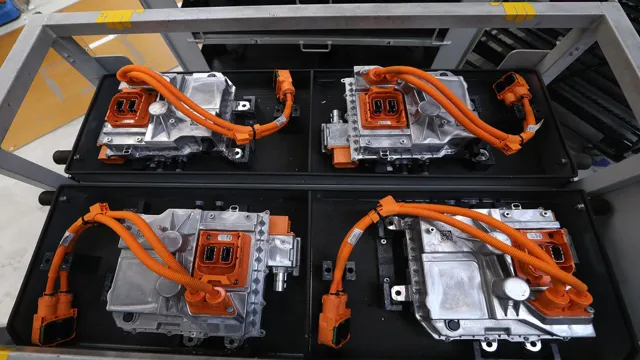Exploring the Truth: Understanding the Degradation of Electric Car Batteries
Electric vehicles have gained in popularity in recent years as people have become more concerned about their impact on the environment. But just like traditional gasoline-powered vehicles, electric cars require regular maintenance – and one of the key components that drivers need to keep an eye on are the batteries. One question on many drivers’ minds is whether electric car batteries deteriorate over time.
We all know that batteries lose their charge eventually, but how does this affect the performance of an electric vehicle? In this blog post, we’ll take a closer look at the lifespan of electric car batteries and explore some of the factors that can impact their deterioration. If you’re considering buying an electric vehicle, or you’re already an EV owner, it’s important to understand how your car’s batteries work and what you can do to help prolong their lifespan. From temperature fluctuations to charging habits, there are several factors that can impact how quickly batteries degrade.
So, settle in and let’s explore the ins and outs of electric car batteries!
Yes, they do
Yes, electric car batteries do indeed deteriorate over time. All batteries experience a natural decline in performance as they are used and charged repeatedly. Even with regular maintenance, the capacity of electric car batteries will reduce over time, leading to a decrease in driving range and overall performance.
This is because the lithium-ion batteries used in electric cars have a limited lifespan, and eventually, their capacity to hold a charge will diminish. However, the rate of deterioration varies depending on a range of factors, including temperature, usage, and charging habits. By taking good care of your electric car battery and following best practices for charging and usage, you can prolong its life and maintain maximum performance for longer.
Regular check-ups and maintenance can also help to identify any issues early on and prevent more significant problems down the line. Ultimately, if you own an electric car, it’s important to be aware of the battery’s lifespan and take steps to keep it in good condition.
Why all batteries deteriorate
Batteries are a great invention that has made our lives much more convenient. We use them to power our cellphones, laptops, and even vehicles. However, as much as we rely on batteries, we must also understand that they deteriorate over time.
Yes, all batteries will eventually lose their ability to hold a charge, even if they are not being used. The degradation of batteries is due to various factors, including temperature, age, and usage. When batteries go through multiple charge and discharge cycles, their internal components start to wear out.
Moreover, heat exacerbates this process and causes the battery to lose its capacity even faster. Therefore, if you want to extend the life of your batteries, it’s best to use them regularly, store them in a cool environment, and avoid overcharging. Remember, batteries won’t last forever, but with proper use and care, you can make the most out of them.

Factors that affect electric car battery life
When it comes to electric cars, the battery life is a major concern for most people. And yes, there are several factors that can affect the lifespan of an electric car battery. The first one is the age of the battery.
Just like any other battery, an electric car battery will naturally degrade over time. Another factor is the total number of charge cycles. The more times the battery is charged, the more wear and tear it will experience.
For this reason, it’s important to avoid unnecessary charging. Additionally, extreme temperatures can significantly impact the health of an electric car battery. High temperatures can cause it to degrade more quickly, while low temperatures can cause it to lose capacity temporarily.
Finally, driving habits can also affect battery life. Aggressive acceleration and braking can put more stress on the battery, leading to shorter life. But by driving sensibly and taking good care of your electric car battery, you can extend its lifespan and enjoy trouble-free motoring for years to come.
How long do they last?
One common concern for those thinking about switching to an electric vehicle is how long the car’s battery will last. While it is true that electric car batteries deteriorate over time, the rate of deterioration can vary widely depending on a number of factors. Generally speaking, most electric car batteries will start to show signs of wear and tear after around five to ten years of use.
However, many manufacturers offer warranties on their batteries for much longer periods of time, often up to 100,000 miles or more. Although it is difficult to predict with certainty how long a particular battery will last, there are steps that can be taken to extend its lifespan. This includes avoiding extreme temperatures, charging the battery to no more than 80% capacity, and adopting a gradual driving style instead of harsh acceleration and braking.
By taking good care of your electric car battery, you can expect it to last for many years to come.
Average lifespan of electric car batteries
Electric car batteries have come a long way in recent years. Initially, their lifespan was a major concern for car buyers. However, the technology has greatly improved and the lifespan of these batteries has increased too.
On average, a modern electric car battery can last anywhere from 8 to 10 years, or up to 150,000 to 200,000 miles. But, it’s important to note that the lifespan of the battery depends on several factors, such as the temperature it’s exposed to, the frequency and type of charging, and how it’s used. In colder climates, the battery’s lifespan may be reduced, while excessive heat can also shorten its lifespan.
To maximize the life of your electric car battery, it’s essential to follow the manufacturer’s guidelines for charging and maintenance. Overall, the lifespan of electric car batteries has improved significantly, meaning that they’re a far more reliable and practical option for drivers looking to reduce their carbon footprint.
Ways to extend battery life
When it comes to batteries, their lifespan can vary depending on numerous factors, such as the device they are used in, frequency of use, and charging habits. On average, most smartphone batteries last between 2-3 years before needing to be replaced. However, there are ways to extend the battery life and squeeze out a bit more usage time.
One simple trick is to lower the screen brightness when not needed, as this consumes a significant amount of battery life. Turning off push notifications and closing out of unused apps can also help conserve battery power. Another effective technique is to limit background app refresh and use battery-saving modes when available.
By implementing these tips, you can help prolong the lifespan of your battery and save yourself from the hassle and expense of needing to replace it too soon.
Cost of replacing an electric car battery
As the popularity of electric cars continues to grow, there’s often a question about how long their batteries last and how much it costs to replace them. The truth is that the lifespan of an electric car battery varies depending on several factors, such as usage pattern, charging habits, and climate. The average lifespan of an electric car battery is around 8-10 years, but it can last longer if taken care of properly.
For instance, if you charge your car frequently and in high temperatures, your battery may wear out faster. On the other hand, if you charge it less often and at cooler temperatures, the battery may last longer. When it comes to the cost of replacing an electric car battery, it can be an expensive process.
Depending on the make and model of the car, the cost can range from $5,000 to $15,000. However, it’s important to note that battery technology is constantly improving, and the cost of replacement is expected to decrease over time. Furthermore, many manufacturers offer warranties that cover the battery for a certain period, typically around 8 years.
If you’re concerned about the cost of battery replacement, it’s important to remember that electric cars are much cheaper to maintain than gas-powered cars. This is because they have fewer moving parts and require less frequent maintenance. When you factor in the savings on fuel and maintenance costs, owning an electric car can be a cost-effective choice in the long run.
Overall, while the cost of replacing an electric car battery can be daunting, it’s important to consider the long-term savings and the environmental benefits of owning an electric car. With proper care, an electric car battery can last a long time, and as technology continues to improve, the cost of replacement is likely to decrease. So, if you’re considering buying an electric car, don’t let the cost of battery replacement scare you off.
Future of electric car batteries
Do electric car batteries deteriorate over time? The answer is a definite yes, but it mostly depends upon the battery chemistry, temperature, charging frequency, discharge usage, and ambient conditions. All electric car batteries suffer from capacity loss over time, commonly known as degradation. Depending on how well the battery is cared for, it will still have a limited lifespan.
The latest lithium-ion batteries technology is more advanced than the previous, which means they have a more extended life. They usually last between 5 to 10 years before needing a replacement. Companies like Tesla, Nissan, and Chevrolet all provide long-term warranties on their electric car batteries, ensuring that early losses in battery capacity will be compensated for.
As electric car technology continues to improve, we can anticipate that batteries will become more reliable and last longer in the future.
Technology advancements
Electric car batteries have come a long way since their invention, but the future of these batteries looks even brighter. In recent years, technology advancements have made electric car batteries more efficient, longer-lasting, and safer than ever before. One of the key developments in this field is the use of solid-state electrolytes.
These materials offer numerous advantages over traditional liquid electrolytes, including higher energy density, longer life span, improved safety, and faster charging times. Furthermore, scientists are exploring new battery chemistries such as lithium-air and sulfur-based batteries that could eventually revolutionize the electric car market. With these advancements, electric cars will be able to drive further and faster, as well as offering a more sustainable solution to traditional gas-powered vehicles.
As technology continues to evolve, we are likely to see even more innovative battery designs, which will bring us closer to the ultimate goal of a fully electric transportation system.
Impact on EV market
The future of electric car batteries is crucial for the continued growth and success of the EV market. The latest technology developments indicate that the next generation of batteries will be more efficient, affordable, and long-lasting than ever before. Solid-state batteries are the latest addition to the EV market, and they offer higher energy density, faster charging times, and better temperature resistance.
The use of solid-state batteries has the potential to overcome the main hurdles currently facing electric cars, such as range anxiety and charging times. However, the production costs of these next-generation batteries are still high, and it may take many years before they are commercially available at competitive prices. Despite the challenges, innovation in battery technology is rapidly advancing and could revolutionize the EV market in the coming years.
The shift towards alternative energy sources such as solar and wind power will also provide additional benefits to the EV market, as it will drive down the costs of charging and create a more sustainable transport infrastructure. The potential for growth in the EV market is immense, and the future of electric car batteries will play a critical role in its success.
Conclusion
In the immortal words of Benjamin Franklin, “nothing is certain except death and taxes.” Unfortunately for electric car batteries, add “deterioration” to that list. While the technology for these batteries continues to improve, they are not immune to the inevitable wear and tear that comes with use.
But fear not, as with most things in life, proper maintenance and care can help mitigate the effects of deterioration and keep your electric car cruising for years to come.”
FAQs
Do electric car batteries deteriorate over time?
Yes, electric car batteries do deteriorate over time due to usage and certain environmental factors such as temperature.
How long do electric car batteries typically last?
The lifespan of electric car batteries varies depending on the manufacturer and model, but most batteries are expected to last between 8-10 years before needing to be replaced.
Can extreme temperatures damage electric car batteries?
Yes, extreme temperatures can damage electric car batteries. High temperatures can cause the battery to degrade faster, while low temperatures can reduce its ability to hold a charge and can even cause it to freeze.
Is there anything that can be done to extend the lifespan of electric car batteries?
Yes, there are ways to extend the lifespan of electric car batteries. This includes limiting exposure to extreme temperatures, avoiding overcharging or completely draining the battery, and using regenerative braking to recharge the battery while driving.




